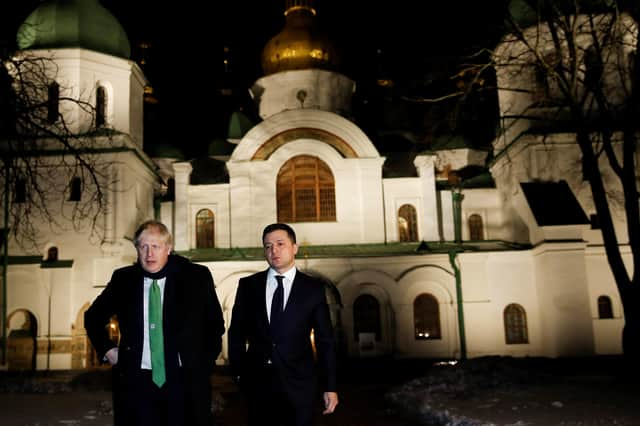Henry McDonald: Boris Johnson should be flying to Ulster as well as Ukraine


You have at present a nuclear armed state massing more than 100,000 troops on their neighbour’s borders.
Coupled with Russian military menace consumers from Kiev to Kilkeel face the prospect of more energy price hikes if Mr Putin pulls the plug on European gas supplies.
Advertisement
Hide AdAdvertisement
Hide AdPutin has already successfully used his influence over energy to spook the Germans into doing nothing in support of the Ukrainians.
So, it was logical that Boris Johnson took time off from his disastrous handling of the ‘partygate’ scandals to fly to Kiev last week in a show of solidarity with Ukraine.
Unlike other nations in the EU Britain did offer material support in the shape of anti-tank weapons and military training. Johnson also swung behind Joe Biden in warning Putin that if he invades Ukraine there will be harsh sanctions imposed on Russia.
But why then has the prime minister not flown to deal directly with another political crisis far closer to home?
Advertisement
Hide AdAdvertisement
Hide AdOf course, the destabilising of devolution in Northern Ireland poses a far less existential threat than the possibility of a Russian invasion of Ukraine.
The two crises in terms of risk to life, liberty and people’s livelihoods are incomparable.
Yet the resignation of Paul Givan last week as first minister, the probable collapse of the Northern Ireland Executive and Assembly mark a grave turning point in the political process here.
Whether the elections are held in March or more likely May the contest will be dominated by one major issue — the Northern Ireland Protocol.
Advertisement
Hide AdAdvertisement
Hide AdUnless the post Brexit deal which has created a border down the Irish Sea between Britain and Northern Ireland is radically altered it is highly likely to cast a long shadow over the Assembly poll.
Even after all the votes are cast any attempt to rebuild a new power sharing coalition at Stormont will be doomed if the protocol remains in its current form.
Senior figures in the DUP including Jeffrey Donaldson have said that if the protocol is still there after the elections, they won’t nominate either first minister or in the case of Sinn Fein emerging as the largest party a deputy first minister.
With Boris Johnson privately telling Donaldson that there was only a 30 per cent chance of Foreign Secretary Liz Truss reaching a deal with the EU over the protocol the post-election deadlock scenario remains the most likely of all outcomes.
Advertisement
Hide AdAdvertisement
Hide AdWhatever your political thinking is you must admit that past premiers were a lot more hands on and attentive to the detail of Northern Irish politics than the current occupant of Number 10 Downing Street.
PMs from John Major to Tony Blair, Gordon Brown and even David Cameron all parachuted into the region at times of crisis.
Some might argue that perhaps those days of prime ministerial interventions to revive devolution and power sharing are long over.
The argument goes that it is high time local politicians took full responsibility themselves for the mess they create rather than crying over to Downing Street to hold their hands as things fall apart.
Advertisement
Hide AdAdvertisement
Hide AdThe trouble with that outlook is this time around the parties do not have full control over the destiny of devolution.
Johnson’s cynicism and seeming indifference to concerns about the protocol destabilising unionism and loyalism is matched by the aloof unconcern of the EU.
The latter has used Northern Ireland as cynically as Johnson and the Tories in the post-Brexit struggles resulting now in devolution going down and social unrest potentially breaking out over the summer.
It is worth remembering that the ‘wrecking ball’ demolishing Boris Johnson’s premiership, Dominic Cummings, once demonstrated his contempt for Northern Ireland when he said he wouldn’t care if the region was dragged into the Atlantic and sunk.
Advertisement
Hide AdAdvertisement
Hide AdThis was when Cummings was Johnson’s key adviser in Downing Street.
The remarks should have sent chills down the spines of unionist leaders back then.
They should remember them now because although Cummings may be gone that little Englander tendency is still a powerful force within the Conservative Party.
If Johnson really does care about Northern Ireland and wants to transmit a powerful signal that the Cummings’ tendency is no more when it comes to matters on this side of the Irish Sea, then he should come to Belfast this week.
Advertisement
Hide AdAdvertisement
Hide AdOf course, his shuttle diplomacy might be scuppered by events in London over the next few days.
In that case we might have to wait a bit longer for a new tenant in Number 10 to chair a fresh round of all-party talks to try reviving the show at Stormont and securing a compromise with Brussels over the protocol.